More than just honey: How local beekeepers in Lancashire are protecting Britain's favourite insect:
Lancashire’s rolling countryside with its picturesque patchwork meadows, woodlands and plentiful hedgerows has long been a haven for wildlife, and of course the honeybee.
However, over recent years due to issues like climate change and the appearance of the Asian hornet on British waters, the importance of pollinators has never been a more important cause.
With populations declining, Lancashire’s beekeepers are stepping up to the mark and are helping to play a crucial role in ensuring that the nation’s beloved insect continues to do nature’s most important job.
Penwortham Beekeeper Arthur Walmsley and the importance of locally produced honey:
One Lancashire beekeeper, Arthur Walmsley has devoted the last 15 years to beekeeping, a hobby of his, which he describes as being very “rewarding”.
He has won prizes at the local show for Honey Wine, mead and melomel, and even sells his own signature jars of honey, which are all made and produced at his Penwortham Apiary.
“I started beekeeping in around 2010 when I had 5 hives passed on from a beekeeper on the Allotment who was giving up. I knew very little about them at that time apart from a quick ½ day introduction”.
Walmsley’s allotment is located in Penwortham, and the “apiary space” is provided by the city council, which he says, “is available for myself and other plot holders should they wish to join in”.
At present Arthur, has a total of 10 hives and last year he made a whopping 170kg of honey, he says that the best part of the job is getting to learn about the bees.
“It’s so interesting, they are fantastic little creatures, you wouldn’t believe the intricacy, it’s a whole different world, a different anatomy and system of things and they are so fascinating”.
With regards to commercialised supermarket honey, Arthur said that “much of the so called ‘honey’ available in UK shops and supermarkets has been adulterated and supplemented with different types of sugar syrups”.
Expressing his frustrations surrounding honey trading standards Walmsley said that” these regulations are not rigorous enough to prevent this trade”.
” If you read the labels on these products, you will see that while it is listed as packaged in the UK it is sourced from outside the UK and the EU.”
” You cannot produce honey, ship it across the world and sell it at the ridiculous price seen on supermarket shelves, it is not honey”.
Encouraging people to buy from a beekeeper he said that “consuming honey that is locally produced could help hay fever sufferers as it can desensitize people to these kinds of allergens”.
It can even help to “heal wounds, due to it containing hydrogen peroxide and being an anti-microbial”.
Walmsley said that there is a strong beekeeping community in Lancashire, with there being “150 beekeepers in the Preston area who are registered with the Preston Beekeepers organisation, which provides training courses and advice for budding beekeepers”.
Creation Honey, Wrea Green, Preston:
Creation Honey, based in Wrea Green is a business with a huge passion for producing delightful products that are made by their hardworking honeybees.
Owned by couple Louise and John Kelso, they started the business back in 2020, after John decided that he wanted to make a bee house as a lockdown project.
“So, we did that and then we said why don’t we get some bees?”
“It literally just started like that, and we got one hive of bees and that turned into two hives, and four into six, and so on!”
As well as making and producing jars of honey, Creation Honey also handcrafts a selection of other products including “candles made from the beeswax that is left over in the hives, soap products and lip balms as well”.
Louise said that what makes Creation Honey so unique from other honey producers is the fact that the business is located in a ‘very green, very coastal area, so you’ve got a varied diet of flora throughout the year, which the bees can collect nectar from and then produce honey”.
Creation Honey also ensures that they remain a sustainable, ethical and ecofriendly company “you see a lot of beekeepers using red chemicals on their bees, we don’t do any of that everything is completely natural”.
The company has also fully immersed itself into the surrounding community of Wrea Green through supplying honey to local café bar “Dizzy Ducks Bistro”.
“Here they have a little bistro where they have local products from local people, so we sell our honey there as well as to other retailers in Poulton and Lytham”.
Louise said that the bees have also helped local agriculture in the area, “we have a local farmer who tracks the yield of his crop, he could see that there was a 20% increase in production, due to the bees pollinating it”.
She believes that bees are essential to nature and the environment and said that “If you don’t look after your pollinators, you’ve got no food, it’s as simple as that really”.
The British Beekeepers Association and the importance of bees for the environment:
Speaking about the recent challenges to British Beekeeping, spokesperson for the BBKA, Ian Campbell expressed concern over the increasing presence of pests and diseases that bees are facing.
“We are concerned about the presence of the Asian hornet. In 2023 we were all taken slightly by surprise when the number of nests went up from under a handful a year to 72 which was a major wakeup call about the dangers that bees are facing”.
On a more optimistic note, the BBKA is hosting its annual Spring Convention this year from the 4th -6th April which beekeeper and spokesperson Ian Campbell is ecstatic about.
Speaking about the event that will be taking place at Harper Adams University in Shropshire he said, “there’s lectures, workshops, seminars and it’s probably the biggest gathering of beekeepers around the country in the year.”
Asked about what advice he would give to budding beekeepers, Ian said to “find your local association, on the BBKA website you can find one near you”.
As well as hoping the number of beekeepers across the country will continue to grow, he also hopes that people will plant flowers and take up gardening to aid the bees.
“Even the smallest patch, such as a window box, can help, let your garden a bit messy. Dandelions are a great early season crop, don’t mow them down.”
“A lot of the concern about honeybees is not just for them and us beekeepers but it’s for the pollination services that honeybees provide, and that helps to ensure our food security, which is closely linked with farming”.
So, taking simple steps like planting more flowers and gardening are things that Campbell hopes more people will take up to help nature’s beloved bumbling honeybee.
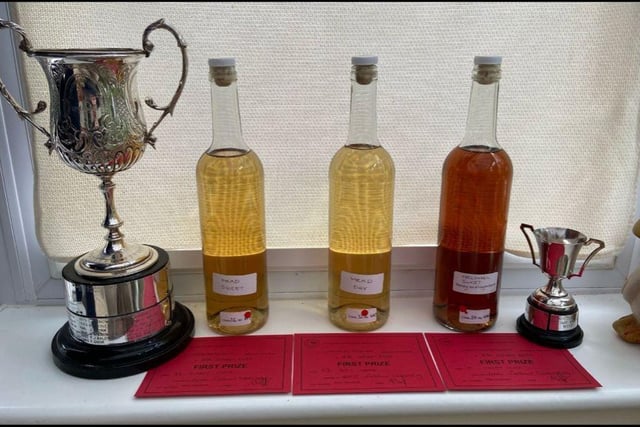
1. Contributed
Arthur Walmsley and his trophy for the best mead in the county Photo: Submitted
Photo Sales
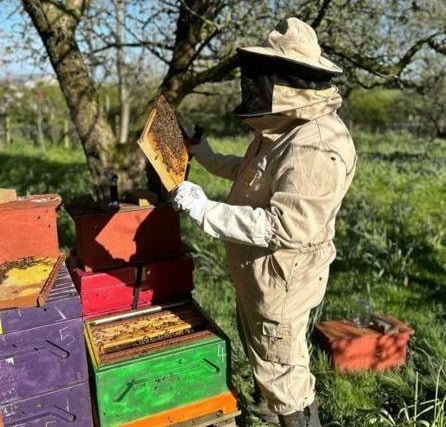
2. Contributed
John Kelso from Creation Honey opening up the hive Photo: Submitted
Photo Sales
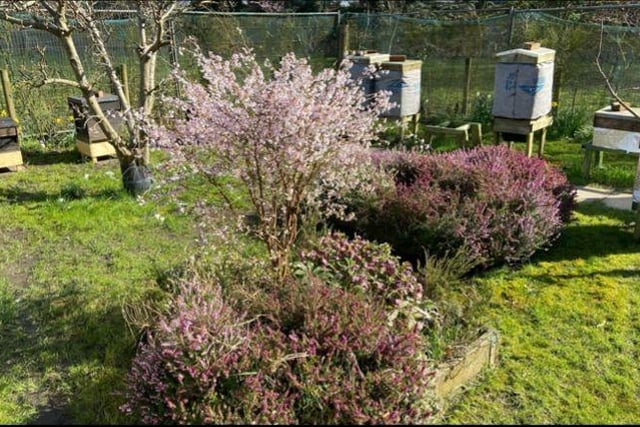
3. Contributed
Arthur Walmsley's Apiary and bee hives Photo: Submitted
Photo Sales
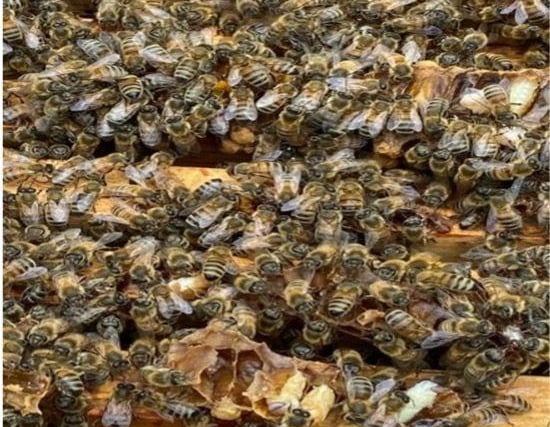
4. Contributed
Bees in Arthur Walmsley's allotment Photo: Submitted
Photo Sales
Lancashire’s rolling countryside with its picturesque patchwork meadows, woodlands and plentiful hedgerows has long been a haven for wildlife, and of course the honeybee.
However, over recent years due to issues like climate change and the appearance of the Asian hornet on British waters, the importance of pollinators has never been a more important cause.
With populations declining, Lancashire’s beekeepers are stepping up to the mark and are helping to play a crucial role in ensuring that the nation’s beloved insect continues to do nature’s most important job.
Penwortham Beekeeper Arthur Walmsley and the importance of locally produced honey:
One Lancashire beekeeper, Arthur Walmsley has devoted the last 15 years to beekeeping, a hobby of his, which he describes as being very “rewarding”.
He has won prizes at the local show for Honey Wine, mead and melomel, and even sells his own signature jars of honey, which are all made and produced at his Penwortham Apiary.
“I started beekeeping in around 2010 when I had 5 hives passed on from a beekeeper on the Allotment who was giving up. I knew very little about them at that time apart from a quick ½ day introduction”.
Walmsley’s allotment is located in Penwortham, and the “apiary space” is provided by the city council, which he says, “is available for myself and other plot holders should they wish to join in”.
At present Arthur, has a total of 10 hives and last year he made a whopping 170kg of honey, he says that the best part of the job is getting to learn about the bees.
“It’s so interesting, they are fantastic little creatures, you wouldn’t believe the intricacy, it’s a whole different world, a different anatomy and system of things and they are so fascinating”.
With regards to commercialised supermarket honey, Arthur said that “much of the so called ‘honey’ available in UK shops and supermarkets has been adulterated and supplemented with different types of sugar syrups”.
Expressing his frustrations surrounding honey trading standards Walmsley said that” these regulations are not rigorous enough to prevent this trade”.
” If you read the labels on these products, you will see that while it is listed as packaged in the UK it is sourced from outside the UK and the EU.”
” You cannot produce honey, ship it across the world and sell it at the ridiculous price seen on supermarket shelves, it is not honey”.
Encouraging people to buy from a beekeeper he said that “consuming honey that is locally produced could help hay fever sufferers as it can desensitize people to these kinds of allergens”.
It can even help to “heal wounds, due to it containing hydrogen peroxide and being an anti-microbial”.
Walmsley said that there is a strong beekeeping community in Lancashire, with there being “150 beekeepers in the Preston area who are registered with the Preston Beekeepers organisation, which provides training courses and advice for budding beekeepers”.
Creation Honey, Wrea Green, Preston:
Creation Honey, based in Wrea Green is a business with a huge passion for producing delightful products that are made by their hardworking honeybees.
Owned by couple Louise and John Kelso, they started the business back in 2020, after John decided that he wanted to make a bee house as a lockdown project.
“So, we did that and then we said why don’t we get some bees?”
“It literally just started like that, and we got one hive of bees and that turned into two hives, and four into six, and so on!”
As well as making and producing jars of honey, Creation Honey also handcrafts a selection of other products including “candles made from the beeswax that is left over in the hives, soap products and lip balms as well”.
Louise said that what makes Creation Honey so unique from other honey producers is the fact that the business is located in a ‘very green, very coastal area, so you’ve got a varied diet of flora throughout the year, which the bees can collect nectar from and then produce honey”.
Creation Honey also ensures that they remain a sustainable, ethical and ecofriendly company “you see a lot of beekeepers using red chemicals on their bees, we don’t do any of that everything is completely natural”.
The company has also fully immersed itself into the surrounding community of Wrea Green through supplying honey to local café bar “Dizzy Ducks Bistro”.
“Here they have a little bistro where they have local products from local people, so we sell our honey there as well as to other retailers in Poulton and Lytham”.
Louise said that the bees have also helped local agriculture in the area, “we have a local farmer who tracks the yield of his crop, he could see that there was a 20% increase in production, due to the bees pollinating it”.
She believes that bees are essential to nature and the environment and said that “If you don’t look after your pollinators, you’ve got no food, it’s as simple as that really”.
The British Beekeepers Association and the importance of bees for the environment:
Speaking about the recent challenges to British Beekeeping, spokesperson for the BBKA, Ian Campbell expressed concern over the increasing presence of pests and diseases that bees are facing.
“We are concerned about the presence of the Asian hornet. In 2023 we were all taken slightly by surprise when the number of nests went up from under a handful a year to 72 which was a major wakeup call about the dangers that bees are facing”.
On a more optimistic note, the BBKA is hosting its annual Spring Convention this year from the 4th -6th April which beekeeper and spokesperson Ian Campbell is ecstatic about.
Speaking about the event that will be taking place at Harper Adams University in Shropshire he said, “there’s lectures, workshops, seminars and it’s probably the biggest gathering of beekeepers around the country in the year.”
Asked about what advice he would give to budding beekeepers, Ian said to “find your local association, on the BBKA website you can find one near you”.
As well as hoping the number of beekeepers across the country will continue to grow, he also hopes that people will plant flowers and take up gardening to aid the bees.
“Even the smallest patch, such as a window box, can help, let your garden a bit messy. Dandelions are a great early season crop, don’t mow them down.”
“A lot of the concern about honeybees is not just for them and us beekeepers but it’s for the pollination services that honeybees provide, and that helps to ensure our food security, which is closely linked with farming”.
So, taking simple steps like planting more flowers and gardening are things that Campbell hopes more people will take up to help nature’s beloved bumbling honeybee.
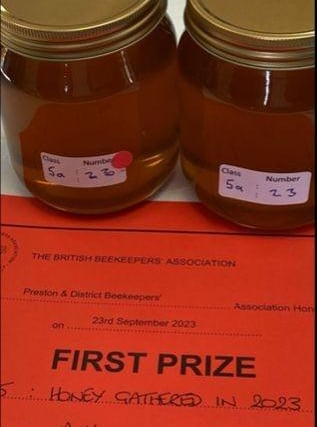
5. Contributed
Jars of honey presented at the BBKA Photo: Submitted
Photo Sales
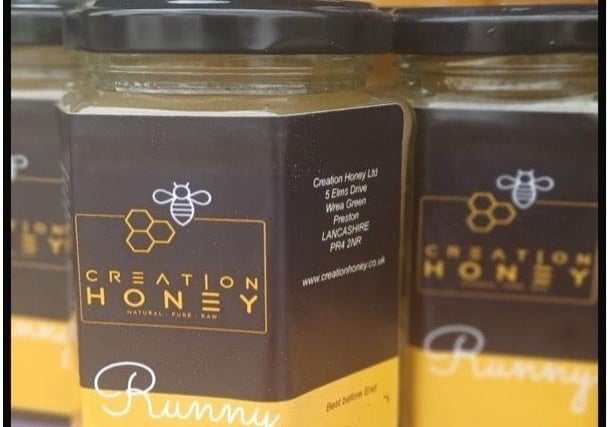
6. Contributed
Creation Honey jars Photo: Submitted
Photo Sales
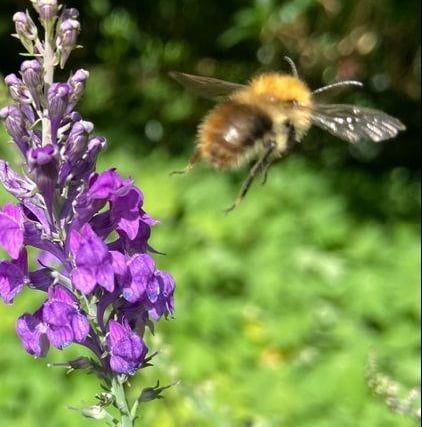
7. Contributed
Photograph taken by Megan Rose Miley -2025 Photo: Submitted
Photo Sales
댓글
댓글 쓰기